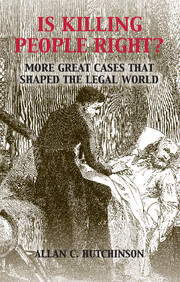Book contents
- Frontmatter
- Dedication
- Contents
- List of figures
- Preface
- 1 Introduction: on the road (again)
- 2 Is killing people right?: law and the end of life
- 3 Oil on troubled waters: the consequences of civil liability
- 4 The politics of law: cats, pigeons and old chestnuts
- 5 The companies we keep: the moralities of business
- 6 Fifty shades of Brown: consent and the criminal law
- 7 Putting up a defence: sex, murder and videotapes
- 8 Wade-ing into controversy: a case of accidental activism
- 9 Playing a different tune: fairness in deal making
- 10 Conclusion: surfing the tides
- Sources
- Index
- References
4 - The politics of law: cats, pigeons and old chestnuts
Published online by Cambridge University Press: 05 May 2016
- Frontmatter
- Dedication
- Contents
- List of figures
- Preface
- 1 Introduction: on the road (again)
- 2 Is killing people right?: law and the end of life
- 3 Oil on troubled waters: the consequences of civil liability
- 4 The politics of law: cats, pigeons and old chestnuts
- 5 The companies we keep: the moralities of business
- 6 Fifty shades of Brown: consent and the criminal law
- 7 Putting up a defence: sex, murder and videotapes
- 8 Wade-ing into controversy: a case of accidental activism
- 9 Playing a different tune: fairness in deal making
- 10 Conclusion: surfing the tides
- Sources
- Index
- References
Summary
Lawyers and judges spend a lot of time insisting that ‘law’ stands to the side and apart from politics. While it is conceded that there are obvious connections and interactions between the two, it is an article of jurisprudential faith that judicial decision making continues on its own terms; it is largely carried out in a professional and detached manner. Judges appreciate the political origins and consequences of their decisions, but they resist the allegation that their own work and contribution are tainted by partisan bias or ideological commitments. If there is a resort to political views and material interests, it is made neutrally and objectively. Indeed, the power and legitimacy of adjudication in a democratic state seem to depend on some account of law being separate from politics. Like referees and umpires, judges are in the politics game, but not players or protagonists in its performance.
Of course, there are many who do not buy this image. For them, its defence is itself a posture of self-serving political convenience; it is all smoke and mirrors. Instead, it is argued that judges and lawyers’ efforts to carve off their professional bailiwick from that of their political cousins is both unconvincing and wrong-headed. Viewed from a critical perspective, the common law is more accurately and usefully portrayed, like Clausewitz's understanding of war, as a continuing process of politics by other means. While judges (and lawyers) talk in a rarefied accent and specialized argot, they are still speaking and trading in the language of politics. This is not to suggest that judges are involved in a Machiavellian conspiracy or something equally suspect; they almost all fulfil their duties in good faith. However, wishing something to be true (i.e., that law is not politics) does not make it so – law and politics are inextricably mixed in with each other. And the effort to insist otherwise is of the most starkly political kind.
One of the most famous and arguably greatest cases in law is the American case Marbury v. Madison in 1803. Referred to as the ‘fountainhead of judicial review’, it is the decision which determined that courts are the final arbiters of what the American Constitution does and does not demand of the other branches of government.
- Type
- Chapter
- Information
- Is Killing People Right?More Great Cases that Shaped the Legal World, pp. 42 - 59Publisher: Cambridge University PressPrint publication year: 2016



